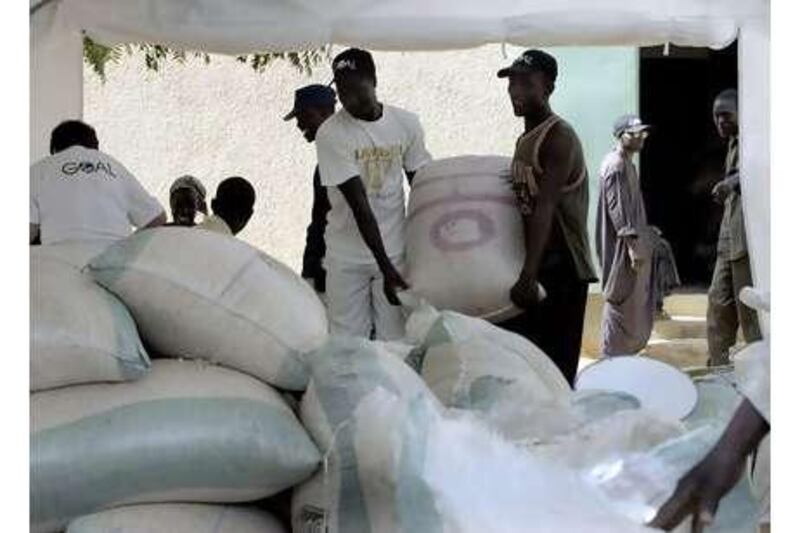NEW YORK // The United Nations this week has renewed efforts to raise cash and help the drought-wracked African region of Sahel, amid reports that 10 million of its residents are being forced to drink filthy water and scavenge through anthills for grain. Aid workers describe an unfolding crisis across Niger, Chad and other parts of the Sahel, an arid ribbon of land running from east to west between the Sahara desert in the north and the Sudanian savannas in the south. The crisis remains "under the radar", they warn, saying that food shortages will likely deepen and claim more lives until the next harvest in November.
The drought's epicentre is Niger, where 7.1 million people - almost half the country's population - are deemed "food insecure". A further 1.6 million Chadians are at risk, as well as people in Mauritania, Mali and other parts of the Sahel strip. Unlike during other drought threats, many marketplaces continue to be stocked with grains, seeds and other foodstuffs - but price hikes have left cash-strapped Africans going hungry because they cannot meet the rising costs.
Oxfam reports that hunger and malnutrition are so bad in some places that people have begun drinking stagnant water, scouring the arid landscape for leaves, boiling inedible berries and plundering anthills for insect grain stores. "In many places, food is available in the markets - it's just too expensive for people to buy," said Oxfam's Eveline Rooijmans. "As food is beyond the reach of so many people, they are trying to survive only eating once a day or once every two days."
Households are selling family gold to keep their children fed for an extra couple of days, many forced to join an exodus from rural areas to cities in search of jobs - often ending up begging or selling sex on street corners, she said. Josette Sheeran, head of the UN's World Food Programme, described "an unfolding catastrophe for millions" in Niger but highlighted the particular threats posed to babies, whose "brains and bodies face permanent damage from acute malnutrition".
The latest figures show that 17 per cent of those under five years old in Niger are badly malnourished - more than a third higher than last year. Unicef estimates that poor nutrition kills 300,000 Sahel children under the age of five each year. "What kills children suffering from malnutrition is disease of some kind, affecting them in their weakened states," Sir John Holmes, the UN's emergency relief coordinator, told potential donors at UN headquarters on Tuesday.
"We are particularly concerned that as the rainy season is starting now, diseases like malaria, diarrhoea and respiratory diseases will spread, as they always do, and the death rates of the affected children will go up rapidly." The UN says three appeals totalling more than US$1.6 billion (Dh5.9bn) remain underfunded by about two-thirds, and points to delays in response to the last drought, five years ago, which led to deaths and slowed down recovery.
"Whole villages are starving and desperate for food with children, nursing mothers, and the elderly particularly at risk," said Oxfam's Kirsty Hughes. "In aid ministries around the world, they know this is happening, they know what needs to happen, and they know that the last time there was a slow response to a major food crisis there in 2005, delays cost lives and it took years for people to recover. The question is: Why don't you act?"
Many Nigeriens and other Africans are struggling from rising food prices, declining remittance cash from overseas relatives and the erratic rains at the end of last year. Cereal harvests are down by 30 per cent in some areas while herders face pasture shortages and have seen livestock prices plummet to $4 per cow. Aid experts point to the underlying causes of poverty that make Sahel residents "extremely vulnerable" to external shocks such as climate change and food price hikes. One of the world's poorest regions suffers from weak infrastructure and offers poor access to clean water, food, education and healthcare.
"Climate change is not going to disappear in the foreseeable future, but we need to make sure we use ... all the resources we have to tackle chronic underinvestment in agriculture, chronic underinvestment in rural infrastructure and things like water retention and water management," added Sir John. @Email:jreinl@thenational.ae






